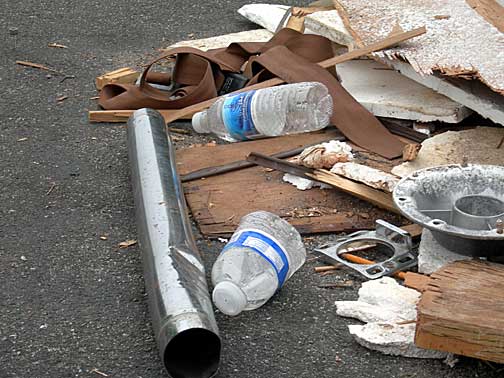
 |
|
|
|
Say NO to bottled water
by Vicki Lee June 2009 The bottled water industry—led by Nestlé, Coke, and Pepsi—aggressively promotes bottled water through sexy marketing campaigns that undermine people’s trust in public water systems. Their campaigns rival the Joe Camel ads that hooked kids on cigarettes and the Happy Cows ads that belie the California dairy industry’s animal factories that dominate subsidized agriculture here. This trendy “healthy” drink can cost 500 to 4,000 times more than tap water.  Production of bottled water for U.S. consumption in 2006 required the equivalent of more than 17 million barrels of oil.. Photo by Debbie Bulger In the U.S. more than 30 billion plastic water bottles are discarded each year. Only 15% are recycled; the rest end up in landfills, or as litter—66 million every day. They can take 1,000 years to decompose and meanwhile they contribute to the vortex of plastic waste in the Pacific Garbage Patch, which may be twice the size of Texas. Smaller bottles are made from polyethylene terephthalate (PET), the manufacture of which generates 100 times more toxic emissions than glass. Researchers found that eight out of 10 PET bottles leave residues of the endocrine disrupter bisphenol A in the water. Exposure to extremely low doses of bisphenol A is strongly linked to breast cancer, prostate cancer, and diabetes. If you are concerned about the quality or taste of your tap water, it is much cheaper and safer to install a water filter on your tap to remove the pollutants than to depend on bottled water. No problems have been associated with refillable stainless steel or aluminum/baked-enamel-lined containers. Reducing our carbon footprint The Pacific Institute estimates that production of bottled water for U.S. consumption in 2006 required the equivalent of more than 17 million barrels of oil, not including the energy used for transportation. This released over 2.5 million tons of carbon dioxide, a major global warming gas. It took three liters of water to produce one liter of bottled water. The total amount of energy embedded in the use of bottled water is the equivalent of filling a plastic bottle one quarter full of oil, according to the Pacific Institute. What you can do Avoid using bottled water unless absolutely necessary. Drink from reusable metal or glass containers filled with tap water when traveling. At public events and at home, offer pitchers of water. Opt for tap water. Take the pledge at: www.stopcorporateabusenow.org/campaign/think_outside_the_bottle_pledge. For more information on the Pacific Garbage Patch, see: www.algalita.org. Reprinted with permission from the Yodeler, newspaper of the Sierra Club San Francisco Bay Chapter.
|
|